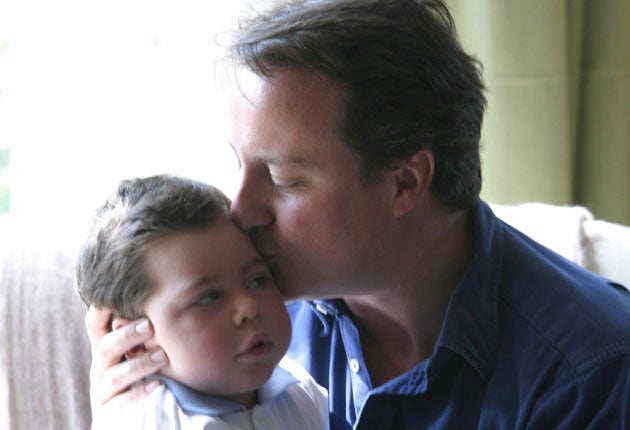Hospices where Ivan's legacy lives on
The Camerons make appeal for carers and charities that helped their eldest child

Hours after their six-year-old son Ivan died on Wednesday morning, David and Samantha Cameron asked well-wishers not to send them flowers. Instead, the couple said, donations should be sent to one of the many institutions which had helped Ivan, who suffered from a combination of severe epilepsy and cerebral palsy known as Ohtahara syndrome, throughout his brief and difficult life.
If it were possible for good to emerge from the death of their eldest child, the Camerons felt, it would be that these care centres, which have been pillars of hope in the lives of thousands of parents, received the recognition they deserve.
Among them are two hospices linked by an unlikely meeting 14 years ago. Sister Frances Dominica, the British nurse who in 1982 opened the world's first children's hospice, Helen House, in Oxfordshire, was invited for coffee by Kathryn Turner, a 55-year-old administrator working at the React children's charity.
Inspired by Helen House, and galvanised by her meeting with Sister Frances, Ms Turner set about trying to create a similar institution in Hampton, Middlesex. It took her 10 years to raise the funds – £3m – with donations ranging from 10p to £100,000.
Eventually, in 2005, the Shooting Star Children's Hospice was founded. At the time it was one of only eight such hospices in the world; today, it is an international standard-bearer. The Camerons, who spend weekends in the Tory leader's constituency of Witney, in Oxfordshire, used Helen House extensively when away from London. But during the week, they relied even more heavily on the outreach services – meaning nursing visits to the family home in Kensington – provided by Shooting Star.
Open 365 days a year, the hospice offers several types of service, entirely free of charge, to parents of children with disabilities. Aside from outreach staff and day care, it provides "end of life care" to support parents in the final stages of children's lives.
As well as family rooms, children's bedrooms and therapy rooms designed to provide relaxation, Shooting Star has an arts and crafts room, a sensory room with soft furnishings and music, outdoor play areas and a peaceful garden for grieving parents. Its hydrotherapy pool and spa is hugely popular because it gives children freedom they otherwise don't have.
"David and Samantha would have outreach nurses visit them quite regularly," said Dalton Leong, a former Barclay's banker who now works full-time as chief executive at Shooting Star. He added: "They also came to us regularly on our short break scheme, where they would drop Ivan and his brother and sister off with us while they recharge their batteries. Sometimes this would be for a few hours; at other times it would be for a few days."
Mr Cameron has said repeatedly that his political outlook has been conditioned hugely by his experience of hospices, which he as Prime Minister would seek to give greater prominence. With growing demand – the paucity of such facilities means they are hugely over-subscribed – comes growing needs too. The centre, which receives only 8 per cent of its funding from the Department of Health, costs £8,000 per day to run. Its annual fundraising target rose last year, from £2.5m to £3m. With a third of its funding coming from local community donations, Britain's recession is going to make hitting that target difficult this year.
Campaigning from some well-known patrons has helped. These include Sir Cliff Richard, Sir Trevor McDonald, Joan Collins, Richard E Grant, Vince Cable and Laurence Llewelyn-Bowen, the last of whom donated £500,000 he earned from a Valentine's Day edition of Who Wants To Be A Millionaire? But few people realise the fragility of these centres' finances, the Spandau Ballet singer Tony Hadley told The Independent yesterday. Hadley has played in several fundraising concerts free of charge for the hospice.
"I was so upset by what happened to Ivan, so upset, as was my wife and everyone we know," he said. "Before I got involved with Shooting Star, I had no idea they received hardly any help from the Government. These places are so fundamental to their communities, and so much good comes of them, that it's just pure scandalous that they struggle for cash. Nothing will bring Ivan back, but if Shooting Star can keep going that will be a wonderful legacy for him to leave."
Wellwishers should sent donations to Mencap, the Friends of St Mary's Hospital or one of three other charities – the Friends of Jack Tizard School; Helen and Douglas House, in Twickenham, and the Shooting Stars House, in Hampton, Middlesex.
Join our commenting forum
Join thought-provoking conversations, follow other Independent readers and see their replies
Comments
Bookmark popover
Removed from bookmarks